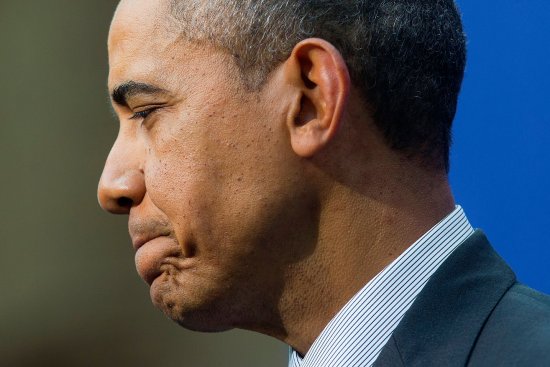
President Obama has asked Congress to "quickly" reform a controversial National Security Administration surveillance program, allowing phone companies to keep data from Americans' calls but requiring authorities to seek judicial approval before accessing it
President Barack Obama called Tuesday for Congress to “quickly” pass legislation to reform a controversial National Security Agency surveillance program.
Obama’s proposal would end the spy agency’s bulk collection of telephone metadata, instead allowing phone companies to keep the data and requiring law enforcement and intelligence officials to seek judicial approval before accessing the information. The new Obama administration proposal follows months of reviews into the surveillance program following its revelation in documents leaked by former NSA contractor Edward Snowden. Speaking to reporters Tuesday in a joint news conference marking the end of the Nuclear Security Summit with Dutch Prime Minister Mark Rutte at The Hague, Obama said the dramatically scaled-back program would answer the concerns of many critics of the surveillance effort.
“This ensures that government is not in possession of that bulk data,” Obama said. “I recognize that people were concerned about what might happen in the future with that bulk data. This proposal that’s been presented to me would eliminate that concern.
“The second thing that people were concerned about is making sure that not only is a judge overseeing the overall program but also that a judge is looking at each individual inquiry that’s made into a database, and this new plan that’s been presented to me does that,” Obama added. “So overall, I’m confident that it allows us to do what is necessary in order to deal with the dangers of a terrorist attack, but does so in a way that addresses some of the concerns that people had raised. And I’m looking forward to working with Congress to make sure we go ahead and pass the enabling legislation quickly, so that we can get on with the business of effective law enforcement.”
Administration officials said they will seek authorization from the Foreign Intelligence Surveillance Court to extend the existing surveillance program until Congress acts.
Asked by a Dutch reporter about lingering effects of revelations of American surveillance of European leaders and foreign nationals, Obama said “any one issue can be an irritant in the relationship between the countries, but it doesn’t define those relationships.”
Obama took aim at “sensationalized” reporting about the scope of American surveillance, but acknowledged why people may be concerned.
“I think the fears about our privacy in this age of the Internet and big data are justified,” Obama said. “I think the actual facts — people would have an assurance that if you are just the ordinary citizen in any of these countries, that your privacy, in fact, is not being invaded on. But I recognize that because of these revelations, that there’s a process that’s taking place where we have to win back the trust, not just of governments but more importantly of ordinary citizens. And that’s not going to happen overnight because I think that there’s a tendency to be skeptical of government and to be skeptical in particular of U.S. intelligence services.
“The step we took that was announced today I think is an example of us slowly, systematically putting in more checks, balances, legal processes,” Obama added. “The good news is that I’m very confident that it can be achieved. And I’m also confident that the core values that America has always believed in — in terms of privacy, rule of law, individual rights — that that has guided, you know, the United States for many years and it will continue to guide us into the future.”